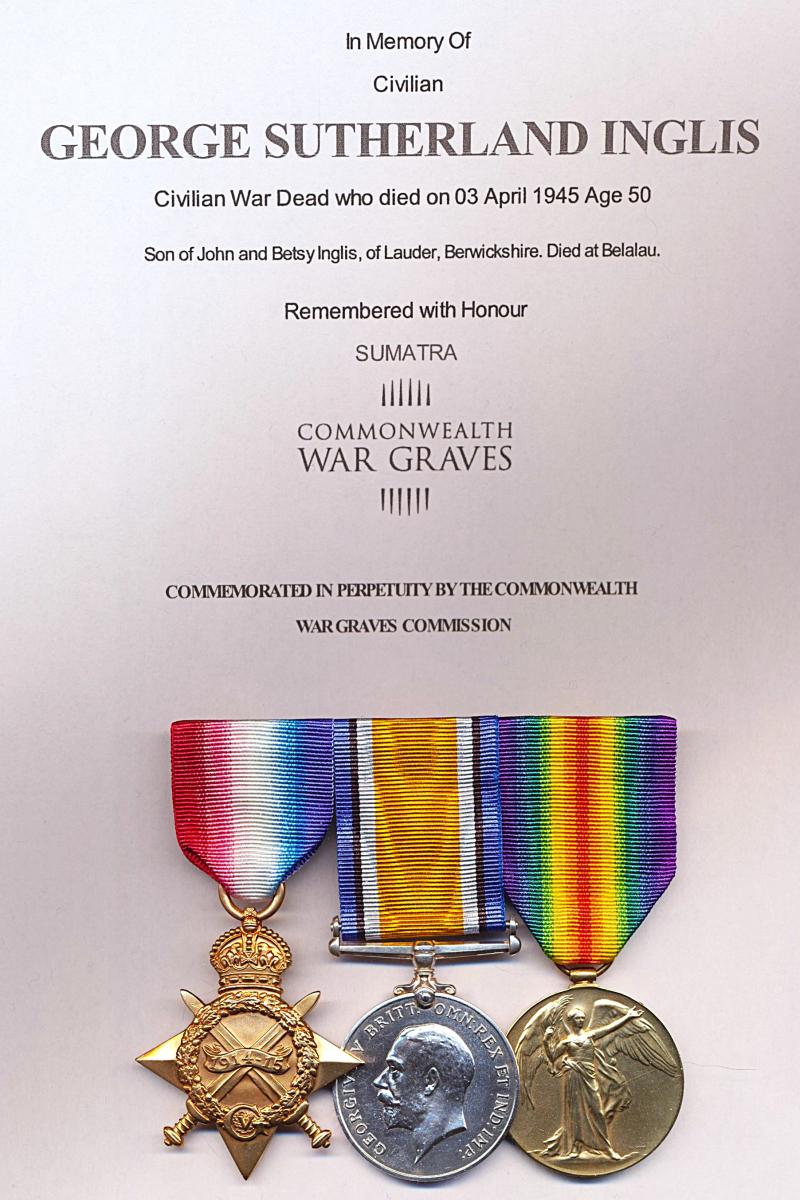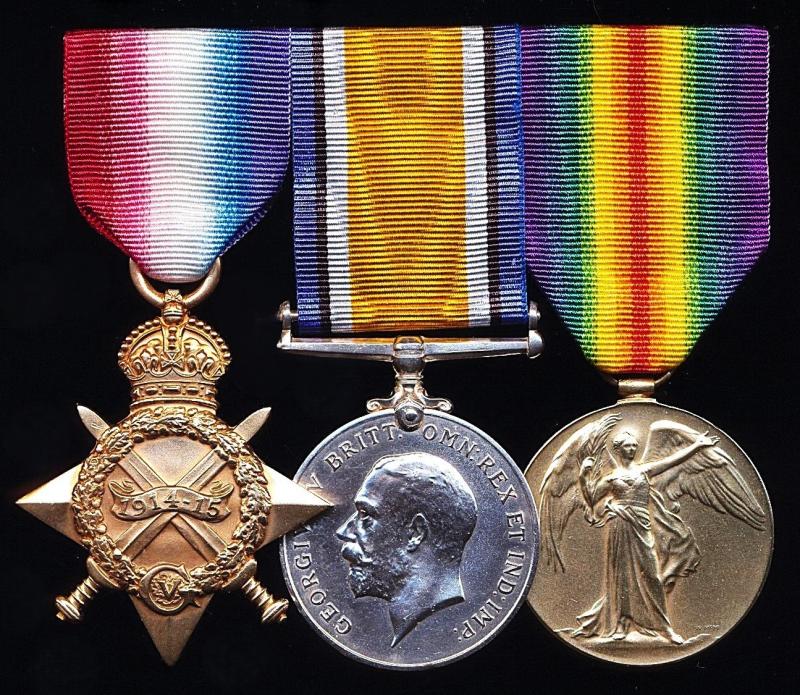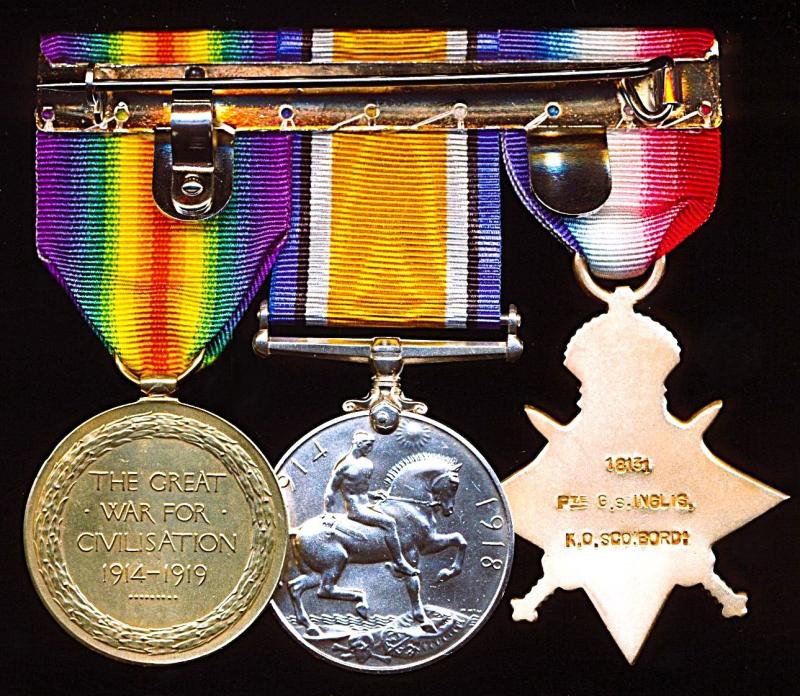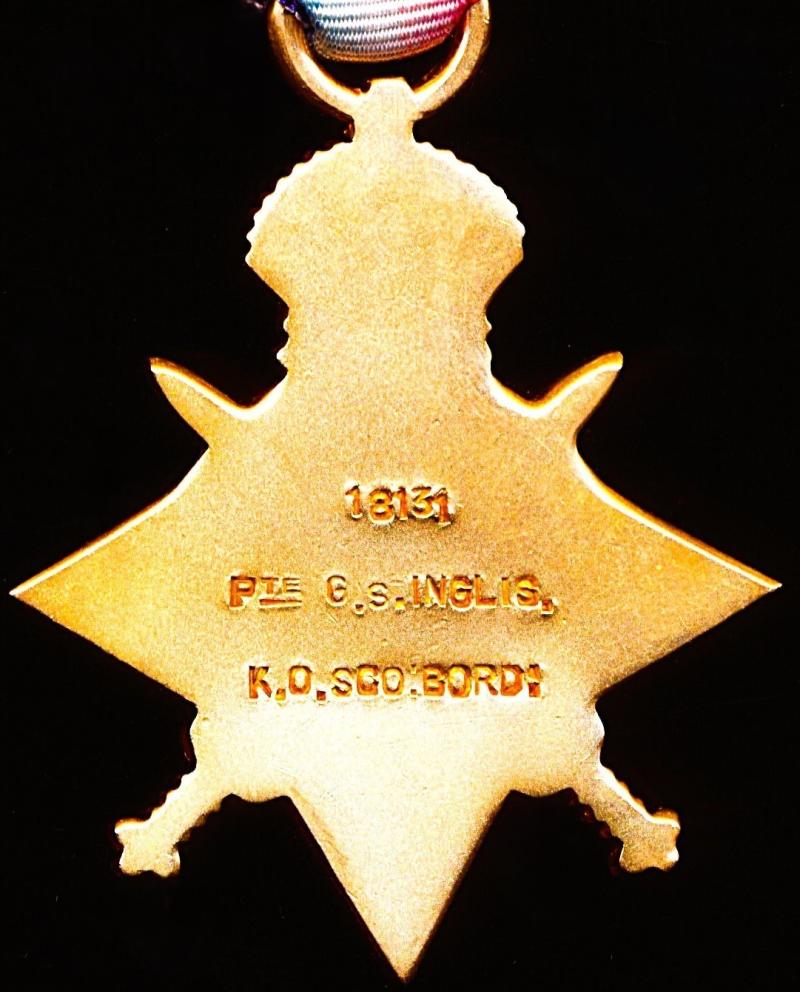'Cheerful to the End'. A Scottish 'Gallipoli' veteran, Rubber & Tea Planter & Far East 'Colonial Broadcaster' Sumatra casualty group of 3: George Sutherland Inglis, Malayan Broadcasting Company, late 1st Battalion King's Own Scottish Borderers
- 1914-15 Star (18131 Pte. G. S. Inglis. K.O.Sco:Bord:)
- British War Medal. Silver issue (18131 Pte. G. S. Inglis. K.O.Sco.Bord.)
- Interallied Victory Medal (18131 Pte. G. S. Inglis. K.O.Sco.Bord.)
Far East Prisoner of War Death: George Sutherland Inglis, is confirmed having died while incarcerated as a Far Eastern Civilian Internee, on, 3 April 1945, at the Loeboeck Internment Camp located at Belalau, Palembang, South Sumatra in what was then the enemy occupied Netherlands East Indies (now Indonesia)
Post-war the bodily remains of George Sutherland Inglis were recovered and re-interred. He now lies buried at the Dutch Honorary Cemetery Pandu, Bandung, Java, Indonesia, where his memorial cross headstone is maintained by the Netherlands War Graves Foundation (Oorlog Graven Stitching). The life and sacrifice of George Sutherland Inglis, is further commemorated in perpetuity in the records of the war dead kept by the Commonwealth War Graves Commission
Medals verification: George Sutherland Inglis is confirmed as entitled to three medals and a Silver War Badge for his services in the Great War as cited per below medal roll sources:
- 1914-15 Star: WO 329/2699 shows entered theatre of war '2b' (Gallipoli) 03/07/15 discharged 18/07/17
- British War Medal. Silver issue: WO 329/1114 shows served 1st Battalion K.O.S.B.
- Interallied Victory Medal: WO 329/1114 shows served 1st Battalion K.O.S.B.
- Silver War Badge (No.157967): WO 329/3030 enlisted 30/01/15 discharged 18/04/17, badge issued 25/03/17. Discharged due to 'Wounds'
Shortly after the end of the Second World War, the below following newspaper article / obituary was published in the 'Berwickshire News' issue of, 16 October 1945:
Quote,
Death Of Lauder Man In Sumatra
After a silence of 3 ½ years news has been received of the death in an internment camp in Sumatra of Mr George Sutherland Inglis the youngest brother of the late Mr James C. Inglis, Lauder. A letter received from a Mr Anderson, a native of Edinburgh, and who was a member of the Camp Hospital Staff, states that a small Dutch vessel left Java, just prior to the fall and in an attempt to reach freedom, was bombed by the Japanese and the survivors reached the mainland of Sumatra. A small boat was obtained with the intention of sailing to Australia but after some days at sea, dysentery broke out and it was decided to put back to a small island where all on board were ultimately captured. Mr Inglis was thrown into prison at Palembang, transferred to Muntok and finally to Belalau, a rubber estate in the centre of South Sumatra where he died of beri-beri and dysentery in April of this year.
The Japs refused to allow sufficient medicine and the food during most of the 3 1/2 years consisted chiefly of rice. a few vegetables and tapioca roots with the result that the health of internees was extremely low. The British death rate at the camp at Belalau reached the high figure of 56 per cent, which is thought to be the highest amongst the internment camps in Sumatra.
Mr Anderson describes Mr Lauder as a grand fellow and as a patient was respected by all the staff. Cheery to the end, he passed away quietly and without pain and was laid to rest in the Camp Cemetery among the rubber trees of Belalau Rubber Estate
Mr Lauder was a native of Lauder and removed to Edinburgh in his early youth. He intended to enter the legal profession but shortly after the outbreak of war in 1914, he joined the K.O.S.B., served at the Dardanelles, and in France when he was seriously wounded and finally discharged. Eventually he took up an appointment on a Rubber Estate in Java and later became manager on a tea plantation in Sumatra. In the early days of the World War he returned to Batavia and was employed in the Consuls Office (Ministry of Information) in Batavia and on the staff of the Malayan Broadcasting Company until the capitulation of Java. Mr Inglis was 49 and a bachelor
Unquote
George Sutherland Inglis, fourth and youngest son of John Inglis (a Gardener) and Betsy Inglis (nee Cormack) as a native of Lauder, Berwickshire, Scotland, where he was born on 10 December 1894. Growing up, George was just one of nine children in the family home, of which he was the youngest, having 3 x brothers and 5 x sisters. George enlisted in the British Army on, 30 January 1915, on which date he was posted to his local infantry regiment, the King's Own Scottish Borderers. After completion of is basic training, George was posted to the 1st Battalion K.O.S.B. and with which unit he held the regimental number 18131. He entered theatre of war 'Gallipoli' on 3 July 1915, when he was sent to the Dardanelles as part of a reinforcement draft for 1/KOSB which unit had incurred horrific casualties since fighting there since 'Day 1' of the ill-fated Gallipoli Campaign. Following the British withdrawal from Gallipoli, 1/KOSB served briefly in Alexandria, Egypt, prior to being embarked for France, where the unit, including George Inglis, landed at Marseilles on, 6 March 1916. During his subsequent service on the 'Western Front;, George was seriously 'Wounded-in-Action'. His wounds being so severe that he was discharged as medically unfit for further military service. Post-war George took up an appointment in South East Asia, where he was employed in the Netherlands East Indies. Passenger shipping manifests from the inter-war years show that George was employed initially as a 'Planter' on a Rubber Plantation located in Java. By 1926, he is recorded having taken up new appointment as a Tea Planter on a Tea Estate located in Sumatra.
George was still resident a resident 'Planter' in the Netherlands East Indies, when the Second World War broke out. He volunteered his services for the 'War Effort' by joining the Malayan Broadcasting Company working under the auspices of the Malayan Ministry of Information from the British Consular Office located in Batavia (now Jakarta, Indonesia)
Medals are professionally swing-mounted. The white metal mounting bar retaining its long hinged pin and clasp fittings
A fascinating colonial medal recipient - and a scarce seen British civilian casualty to an internee who died in Sumatra, Netherlands East Indies
Condition: EF
Code: 24557
595.00 GBP







